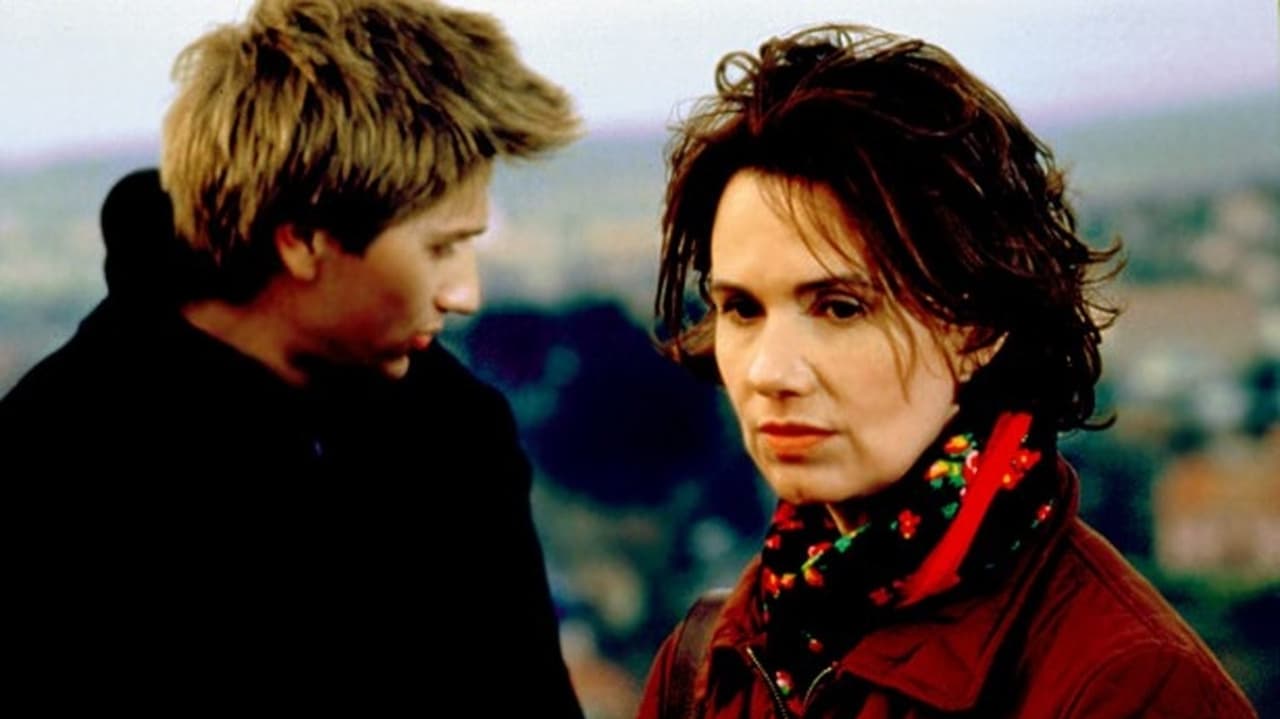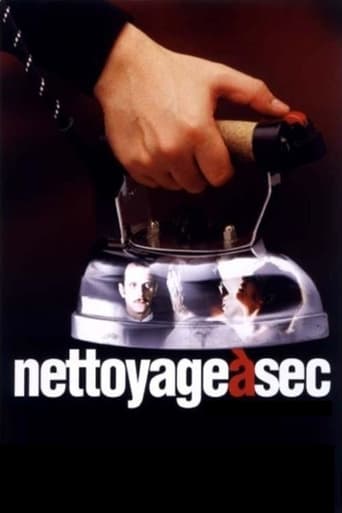

It's impossible - for me at least - to know whether or not Ann Fontaine was familiar with Joe Orton's sixties play Entertaining Mister Sloane (subsequently filmed)before writing and directing Nettoyage a sec some thirty years later but it is reasonable to assume that the central premise - bi-sexual catalyst male enters and ultimately disrupts household via sexual encounters with both male and female - is very similar with, in the case of the latter, a Gallic twist. Orton's protagonist disrupted a home occupied by a brother and sister both childless whilst Fontaine's shares a home with a married couple who have a child. There are, of course, other substantial differences, where Mr Sloane came, as it were, out of nowhere, Loic (Stanislas Merhar) is first encountered by Nicole (Miou-Miou) and Jean-Marie (Charles Berning) Kunstler in a club where he is performing a cross-dressing act with his sister Marilyn (Mathilde Seigner)and only goes to live with the Kunstlers some time later when Marilyn leaves both him and the act in favour of life with her boy friend. The Kunstlers have been married for some fifteen years and it may be said that the marriage has become as 'dry' as the dry cleaning business they own and is in need of sexual 'cleaning'. If so they came to the right place for the amoral Loic is happy to oblige, first by seducing Nicole - not terribly difficult as she was ripe for seduction - and then, with less success, Jean-Marie. What we have here is a fine, tightly written and directed script acted to perfection by the three principals and arguably the finest of Fontaines early films - Berning would later appear in her How I Killed My Father. Very definitely worth seeing.
... View MoreSpoilers..."Dry cleaning", that's what the title of this Anne Fontaine's effort means in English and it's a well-appropriated one to qualify the contents of the story she tells the audience. Its bulk essentially occurs in a dry-cleaner whose purpose is to clean the customers' clothes but the director prefers to soil her couple's clear conscience as well as their moral, sexual conventions.Could this film be a crossing between Claude Chabrol's universe and Pier Paolo Pasolini's film "Theorema" (1968)? It's highly possible and they're respectable credentials for this novel, idiosyncratic film. The first one for the provincial backdrop and a dash of gastronomy. The author of "le Boucher" (1970) and "les Noces Rouges" (1973) excelled when it came to depict vignettes of provincial life, in the Kunstler's shop and apartment but also in the town itself. Anne Fontaine just has to describe with just a few features, the gloomy aura which reigns in Belfort. And the second reference for of course the story of the film which bears a strong resemblance with Pasolini's opus: both introduced a young man who subverted a comfortable universe and caused damage in them. "Nettoyage à Sec" could be an updated version of "Theorema".Loïc is the disruptive element in the Kunstler's "petit bourgeois" world. More than this, he's the catalyst of their buried desires and passions. Before making their dreary universe with its constricting etiquette falter in the dry-cleaner's, he will at first indirectly galvanize them to accomplish their desires. The week-end in Bâle, unusual in the couple' life is a proof of it. Before this, one of the key sequences is the one when the four protagonists are together in the hotel room because in this moment, the persona of Jean Marie and especially Nicole is well construed and defined. It's necessary to steer well the evolution and crucial steps of the story. Nicole makes love with Loïc and it's a sign that she's tired of her life and is ready to go in a new direction. Later, Fontaine will intersperse her film with conspicuous signs which don't fool anyone. See the scene in the restaurant: she confesses to her husband that she doesn't feel courageous enough to carry on her nine-to-five life in the dry-cleaner's. She's on the verge of packing in. Jean-Marie's answer is meaningful: "however when we started, you wanted to be the first one to help me to settle here...". So, it seems perfectly logical that later she accepts Loïc's advances. As for Jean-Marie, he appears hesitant and undetermined but maybe would he like (unconsciously or not) change his life in spite of an eloquent sequence: when he takes Loïc downstairs to show him concrete memories of his first years spent in the shop. Memories to which he is deeply attached...Loïc's demeanor is rather elusive and it's hard to decipher his mainspring. Is it because he lost his closest human being in the world (Marilyn) that he settles to Nicole and Jean-Marie? Is he sick of his nomad life despite what he says to the couple? By enticing the couple, does he try to fulfill an affective gap in his life? It was shrewd from Fontaine to make opaque his motivations. Thus, he keeps all his mystery. It was also clever from the director to have chosen evocative colors for her film and she's got a sense of light. The white of the dry-cleaner's sharply contrasts with the half-murky, dimly light rooms in the apartment, especially when Loïc is in these rooms. This to underscore that the life of the couple with Loïc's intrusion goes bit by bit unravel. She also has the gift to build her film on a relentless crescendo and to shroud it with an increasingly latent, ominous tension. A tension caused by several factors: disquieting moments or lines pronounced by Loïc, by the contrast between the appearance the couple gives to the customers and employees and what lies beneath this when they are in the apartment with Loïc, especially when the latter finds himself with Nicole. And it won't take long for Jean Marie to discover their love affair. But also with Jean-Marie's tantrums he has to try to resist to the strange attraction he feels for Loïc. His short wild mood swings are the result of a sexual repression he vainly wants to conceal. Loïc will feel it very well in the inevitable sequence in which he will try to sodomize him (a violent one which packs a real wallop). After this scene, one could argue that the couple came back to where they started but in worse: Nicole and Jean-Marie are destroyed.The acting is uniformly good and largely lives up to the demands of the scenario. The type of character of each actor of the quartet complements one another. Although the film really put Mathilde Seigner on the map, it's her coy, brazen partner Stanislas Mehrer who gets the lion's share. I don't put Charles Berling and Miou-Miou in my straitjacket of favorite French actors but here, I was very taken with their acting."Nettoyage à Sec" has a taut, well-constructed scenario in which every step of the story rings true. It's an unsettling piece of work which leaves indelible stains. It may also walk a fine line with works like "Harry: Un Ami Qui Vous Veut Du Bien" (2000) by Dominik Moll which could be his little brother. I would like to discover Anne Fontaine's anterior and subsequent works to her 1997 film.
... View MoreTo me, a romantically inclined gay man, this was a fascinating but ultimately unfulfilling tale of a `normal' French couple, Nicole and Jean-Marie Kunstler, who have grown unsatisfied with their settled, routine lives. The couple runs a dry cleaning business in an unexciting small French town. Their lives change when they go to a bar with some business associates and encounter Loïc and Marylin, a cross dressing brother/sister act. From the first, the couple is fascinated with the pair but particularly with Loïc, the sexually ambiguous brother, (played to perfection by Stanislas Merhar).The couple is so enchanted with the pair that they take a weekend to the city where the performers are appearing next. When the sister decides to end the act and run away with her lover, the brother insinuates himself into the couples lives. The young man claims to be, and is by all indications, straight and soon takes the wife as a lover. The husband is also aroused by the boy but denies his attraction. Soon the boy is living in the couple's home and working in the Dry Cleaning shop and is showing a talent for that type of work. He even befriends the couple's child and helps him with homework and takes him skating.Whether his good work arises from Loïc's desire to repay Jean-Marie or from some innate talent for dry cleaning is unclear. I think that Loïc feels guilty about cuckolding this man who has shown him nothing but kindness, genuinely likes the guy, and is aware of the man's attraction to him. He wants to make amends in any way that he can. Ultimately Loïc offers himself to Jean-Marie physically but is rebuffed. Whether it's the husband's `homosexual panic' or his actually seeing his wife with Loïc during one of their trysts, Jean-Marie decides that Loïc must go. This leads to the final and I think dissatisfying concluding scenes.
... View MoreThe mellow, mesmerising tune of the theme music by Edouard Dubois made me watch this movie twice while on a transcontinental flight. The music was only one reason among others that made me watch the film twice in four hours. I am a French film enthusiast and the contents of the film (latent homosexuality, guilt, cross dressing, etc.)were not out of the ordinary. What was striking in the film was the deliberate, structured screenplay that made me recall early works of Marcel Carne. I was not surprised to learn that the screenplay won an award at the prestigious Venice Film Festival and nominated for a Cesar in France.The film's beginning and end revolve around affirmation of marital bonds, while the bulk of the film (to me only the sub-plot) ventures into transgression of those bonds followed by redemption. There is sadness at the end but it also accompanied by a silent studied reaffirmation of faith between man and wife. The final walk of the duo is an ordinary event yet captured powerfully in this film. I recommend this film to those who have not seen it not as a film that is extraordinary, but one which encourages viewers to introspect and look at ordinary lives, not of superheroes but of less than perfect men and women. The film succeeds because of low-keyed acting (Merhar and Miou-Miou), the sombre yet mesmerising music and good mise-en-scene. The film discusses "drycleaning" of two individuals' marital life, but the script and the director elevate the wife as strong personality with a level-headed strength developed quite unobtrusively as the film progresses. Anne Fontaine, the director, is someone to watch out for in the future as is Edouard Dubois. In more ways than one (direction, cinematography, the script) the film gives a woman's perspective of the story, though a wee bit sombre.
... View More